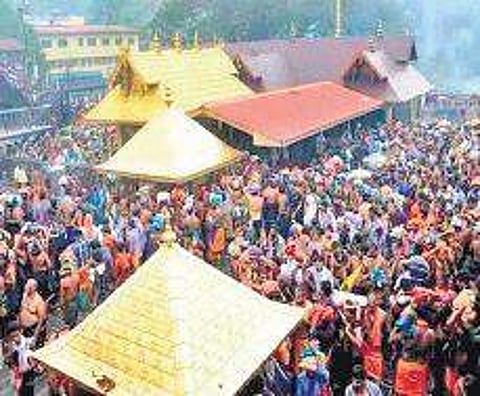

The verdict of the Supreme Court on the Sabarimala case has ‘shocked’ me. This judgment has been passed as a response to the claims of ‘misogyny’ and ‘discrimination of women’ and promises to do away with both. No one in their right mind would argue against these ‘foundations’ of the judgment. However, neither do these ‘foundations’ reflect the accuracy of the situation nor do they actively, or even historically, exist. The judgment has been ‘rationalised’ based on progressive ideals rather than being inherently ‘rational’.
The court’s verdict might lead to religious tensions, deepen prejudices among castes and sub-castes and lead to a disintegration of society. All religions have a categorical framework for their respective beliefs, values and traditions which was not developed overnight. It took centuries of dynamic progression to be consolidated and institutionalised. The Sabarimala temple is a 12th century construction of antiquity developed through a systemic study of cultural, social and religious notions.
The tradition of prohibiting women who are actively in the menstrual phase of their lives (roughly between the age of 10 to 50) on the temple premises was not to criminalise or shame menstruation and women. Rather, it was to uphold the celibacy of the main deity in the temple.
Religion is not solely based on reasoning like the natural sciences. It is based on a convoluted mix of reasoning and faith, the latter being more utilised to justify in religious arguments. The lack of understanding of this convoluted intricateness led to the formation of a void between reasoning and faith in the case of Sabarimala which was filled with cries of misogyny, discrimination and imbecility, thus paving the path for the verdict.
‘Unity in diversity’ is the theme of our country. The India that I grew up learning about throughout my school years was a country known for its accommodation of all religions, languages, food and clothing variations, geographical asymmetries and ideological variations in a peaceful and harmonious manner. However, the recent verdict could instigate claims questioning secularity and further sow the seeds of integration based on communal lines. I would say this verdict can lead to a transgression of the theme of ‘Unity in diversity’ to ‘Diversity in Unity.’
This has been historically proved by humanity in the case of Nazi Germany, the recent Rwandan genocide and other instances of engrained violence and conflict. This is a cause of concern and worry, especially in the case of India post 1980s leading to the communal conflicts in Ajodhya (1992), Gujarat (2002) and Pune (2018) and a deepening of prejudices against other religions and castes. The verdict has led to a widespread disenfranchisement of the people who ardently upheld their religious practices and beliefs for decades.
I’ve always believed analysing the present, devoid of the past and historical context and disregarding the probabilities of tomorrow, is irrational and gratuitous. The court’s verdict is naïve and ostentatious towards a certain section of an un-informed (not ill-informed) public. Therefore, I vehemently support at least a thorough re-evaluation of the process of decision making in this case should be undertaken, if not an immediate reversal of the decision.
(The author is state president of the Kerala Brahmana Sabha. The views expressed by the author are his own).